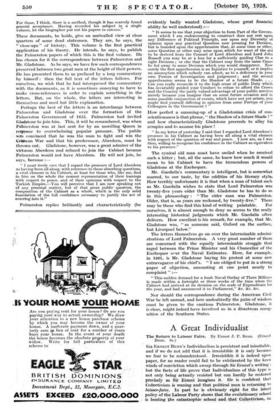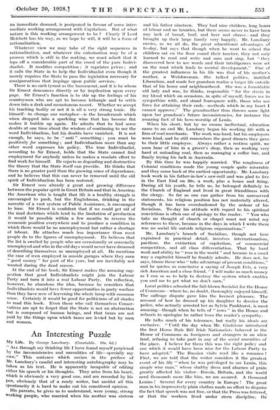A Great Individualist
The Return to Laisser Faire. By Ernest J. P: Bonn. (Ernest Benn. W.)
Sur ERNEST l3m.rx's Individualism is persistent and inimitable, and if we do not add that it is irresistible it is only because we fear to be misunderstood. Irresistible it is indeed upon paper, for no reader could fail to be exhilarated by the keen winds of conviction which sweep through Sir Ernest's writing ; but the facts of life prove that Individualism of this type is not only being actually resisted but can hardly be restored precisely us Sir Ernest imagines it. He is confident that Collectivism is waning and that political man is returning to laitiser-faife. In part he is obviously right for the latest policy of the Labour Party shows that the evolutionary school is beating the catastrophic school and that Collectivism, as an immediate demand, is postponed in favour of some inter- mediate working arrangement with Capitalism. But of what nature is this working arrangement to be ? Clearly if Lord Melchett has his way, as we hope he will, it will be a form of rationalization.
Whatever view we may take of the right sequences in rationalization, and whatever the culmination may be of a process which is still in the making, we must admit that it lops off a considerable part of the creed of the pure Indivi- dualist. It modifies competition ; it regulates prices ; and it calls the State in to help the Individualist even though it merely requires the State to pass the legislation necessary for amalgamations that impinge upon public services.
There is no such tyrant as the bureaucrat, and it is he whom Sir Ernest denounces directly or by implication upon every page. Sir Ernest's function is to stir up the feelings of his countrymen who are apt to become lethargic and to settle down into a drab and monotonous assent. Whether we accept his teaching bodily or not it is all a very strong tonic. He himself—to change our metaphor—is the breadcrumb which when dropped into a sparkling wine that has become flat makes it bubble up again. - He admits that he had some doubts at one time about the wisdom of continuing to use the word Individualism, but,his doubts have vanished. It is not enough, he says, to be _" anti " _ something ; you must be positively for something ; and Individualism more than any other word expresses his policy. The true Individualist, according to Sir. Ernest, holds that 'the State cannot find employment for anybody unless he makes a resolute effort to find work for himself. He rejects as degrading and destructive the theory that the State itself can provide. He thinks that there is no greater peril than the growing sense of dependence, and he believes that this can never be removed until the old spirit of Individualism has been restored.
Sir Ernest sees already a great and growing difference between the popular spirit in Great Britain and that in America; the American who is taught that life is a healthy struggle is encouraged to push, but the Englishman, drinking in the narcotic of a vast system of Public Assistance, is encouraged
to 4ea:- Ernest is confident that if we could get rid of the mad doetrines which tend to the limitation of production it would be possible within a few months to reverse the economic position everywhere and to' produce a condition in which there would be no unemployment but rather a shortage of labour. He attaches much less importance than most people do to the figures of unemployment. He believes that the list is swelled by people who are occasionally or seasonally unemployed and who in the old days would never have dreamed of describing themselves as unemployed at all. He mentions the case of men employed in seaside garages where they earn " good money " for part of the year, but are inevitably not wanted during the dead season.
At the end of his book, Sir Ernest makes the amusing sug- gestion that good Individualists might join the Labour Party and turn it into a real Labour Party. On reflection, however, he abandons the idea, because he considers that Individualists would have fewer opportunities in party warfare than they have now of leavening the whole lump with common sense. Certainly it would be good for politicians of all shades to read this book. Even those who call themselves Conser- vatives are apt to forget that the State is not an abstraction but is composed of human beings, and that taxes are not paid by the things upon which taxes are levied but by men and women.































































 Previous page
Previous page